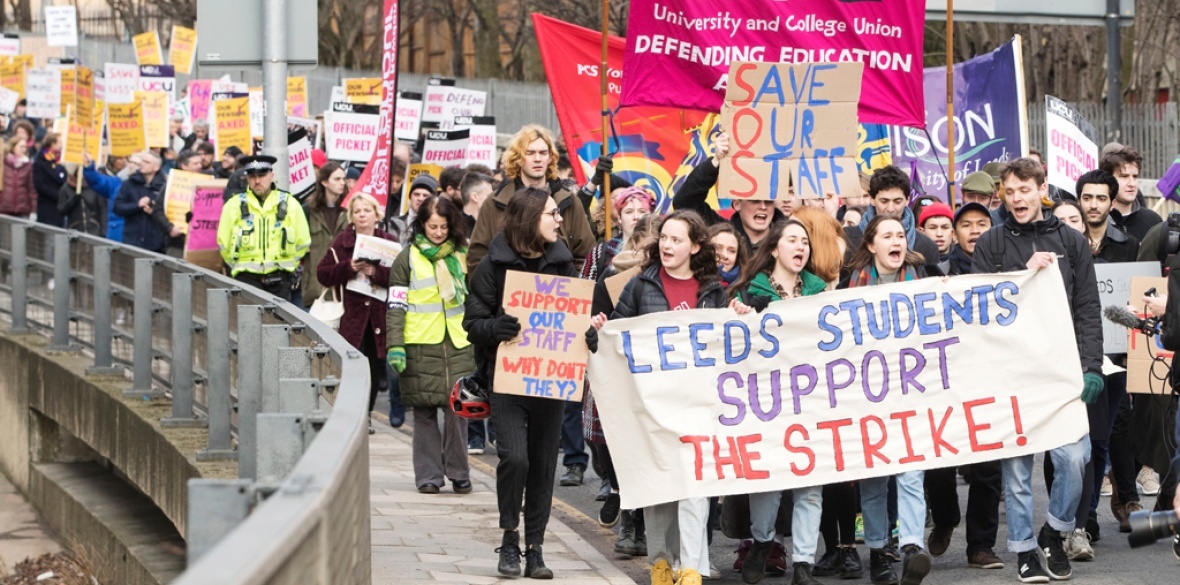Thursday 20th of February will mark the first in fourteen days of strike action spread over four weeks taken by the country’s largest Higher-Education union, University and College Union (UCU). UCU will be calling on its members in 74 UK universities to walk out and protest over the issues of pay, working conditions and pensions.
If this all feels like déjà vu to you, it’s because it is – these are the same disputes which sparked the industrial action taken in November and December of last year. In fact, if you are a student in your third year at Leeds, you or one of your housemates are likely to have witnessed strikes in two years of study.
The fresh round of strikes come in spite of negotiations with Universities UK (of which Leeds is one of over 130 universities), which have been described as productive by both sides. However, the UCU argues that Universities UK has not moved far enough, making only vague commitments on working conditions as well as refusing to commit to any further pay rises or aiding the rising cost of pension contributions.
Converseley, the Universities and Colleges Employment Association (UCEA), argues that its ‘without prejudice modified offer’ makes ‘significant positive proposals’ on work load, zero hours’ contracts and gender/ethnicity pay gaps. For UCEA, this represents a national employer going ‘a great deal further than ever before’ to satisfy UCU’s demands.
Moreover, the association claims that employers cannot afford to cover the cost of pension contribution rises or satisfy calls for further wage increases, two of the primary sticking points of the last round of industrial action. While the 1.8% increase in pay agreed by previous talks is above the current rate of inflation (by 0.1%), UCU argues that it is not sufficient to keep up with the rising cost of living.
However, the purpose of this article is not to contest the validity of both sides’ claims. The issues are clearly not straightforward. What is clear though is the detrimental toll that the continuing legacy of strikes is having on students and staff. It is astounding to me how a top ranking Russell Group university can maintain such a position while at the same time squeezing its educators and neglecting those who pay £9,250+ per year for the privilege of attending.
What is even more disheartening is the fact that LUU, the body entrusted with championing our interests, has failed to take on the fight. Again, I appreciate that LUU’s student executives are caught between a rock and a hard place – that to take a side could alienate a large portion of their student base. But if they are truly ‘committed to representing the best interests of students’, then they should be taking steps to extract concessions for students from the University.
This would not be out of step with actions that have already been taken nationally. In May 2019, for example, the Office of the Independent Adjudicator called upon some universities to refund up to half of tuition fees for failing to make up teaching time during 14 days of strikes that took place in the previous year. Compensation does not have to be strictly monetary – everything from extending dissertation deadlines to reflective consideration in the of grading assignments should be considered appropriate.
While LUU has taken some positive steps in directing students to information about how to support the strikes or to question the University’s Vice Chancellor, they should be doing far more to channel students’ dissatisfaction into concrete political change.
The student body can also use its collective agency to ensure that there is some price to pay for the persistent disruption to our education. Along with students contacting their MP and school rep, answering the National Students Survey honestly about the effects of the strikes could have a significant impact on the University’s position.
The NSS is highly influential for both the reputations of Universities and the choices made by prospective students. The prospect of putting the University’s internationally renowned reputation on the line through low satisfaction scores on the NSS may cause the University to re-evaluate its position on the strikes, as well as the level of compensation given to students.
It is clear that the staff going without pay and the students going without teaching are the ones who will suffer. It is time for students and their representatives to make their voices heard.
A spokesperson from the University of Leeds said:
“We are disappointed that UCU is planning this industrial action. While in reality it will be a minority of staff that are likely to strike, our priority will be to minimise disruption to students and to ensure that we continue to communicate with colleagues about the issues at the heart of this action.
We will do all that we can to recover missed learning opportunities, and each School is taking steps to ensure that students are assessed based on the learning activities that have been delivered.”
Image Credit: Morning Star, 2018

